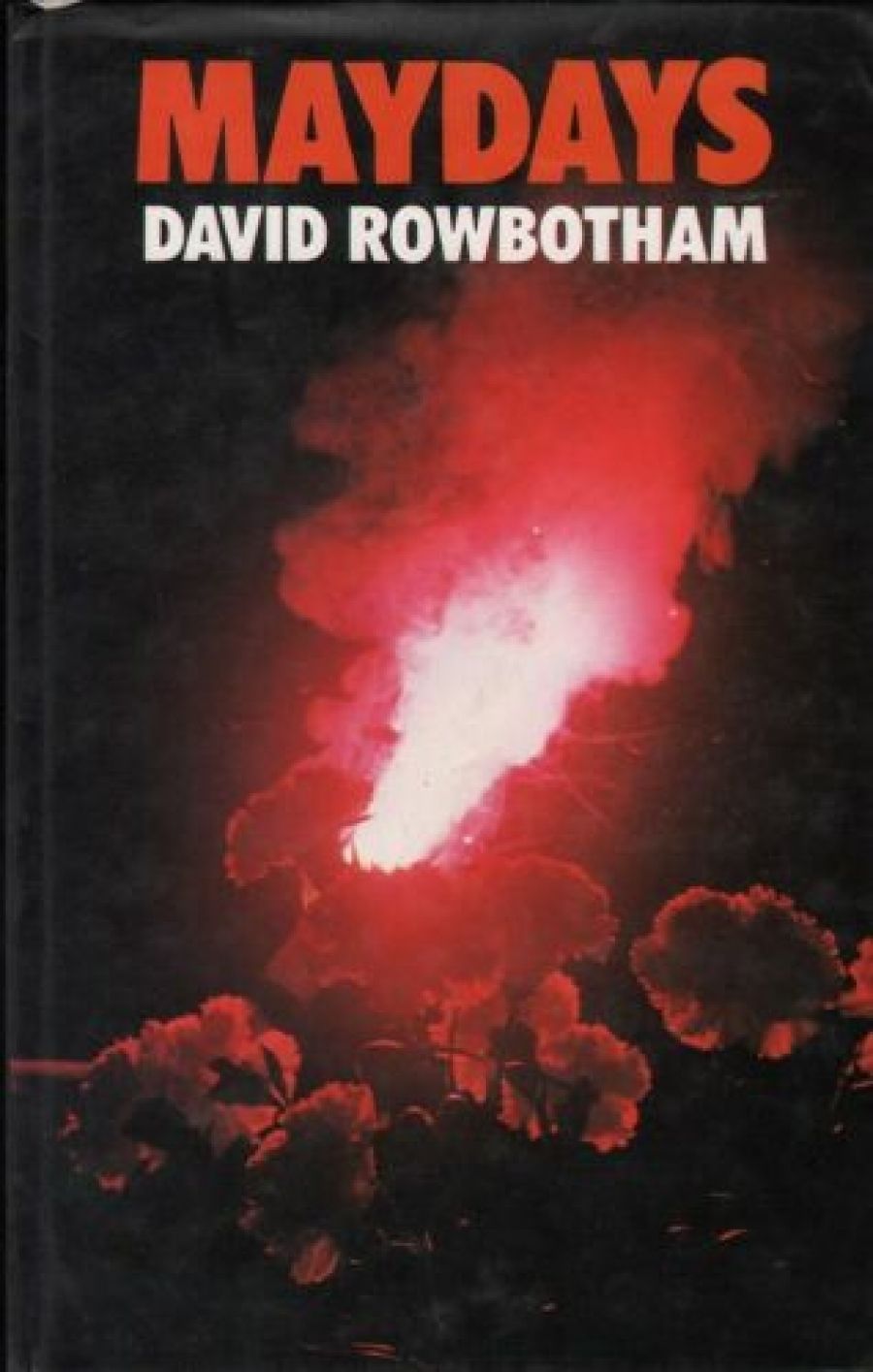
- Free Article: No
- Contents Category: Australian Poetry
- Review Article: Yes
- Article Title: An Age of Vigilance
- Online Only: No
- Custom Highlight Text:
It is five years since Rowbotham’s Selected Poems, one of that extraordinary number of summing-up volumes that has been, perhaps, last decade’s most telling and characteristic factor. The need to gauge one’s own work (and focus) from some working perspective has always been the basis of a living poet’s Selected Poems. But this decade’s perspective makers have, almost without exception, shared an additional, if implied, purpose: their selections point to a stocktaking rather than a summarising intention.
- Book 1 Title: Maydays
- Book 1 Biblio: UQP, $14.95 hb, $7.95 pb
David Rowbotham’s Selected Poems showed a quite individual growth from early nature lyrics and observations (Rowbotham was one of the most frequently published of the Bulletin lyricists in the post-war years, the heyday of Douglas Stewart’s editorship and flair) to a nuttier, more introverted questioning. Some of the later poems had a thoughtful and philosophical determination to worry-through an issue to its depth that is noticeably rare in recent Australian writing – the decade of the stick-on summary. The less pleasing of Rowbotham’s mannerisms involved a tendency to rather dense, prosy lines (usually brought about by over-literary sentence structures) and a sort of withdrawal to faded rhetorics. The best work revealed a sharp ear for heard turn-of-phrase and an ability to integrate this (usually after an arresting opening line or sentence) with more thoughtful or ruminative ‘development’ without losing pace or intensity. If the shadow of Douglas Stewart hovered over the early Rowbotham work, R.D. Fitzgerald might (without loss or disparagement to Rowbotham) be suggested as a point of comparison with the later output. I once suggested, also, A.D. Hope, but there is a gallant quality in Hope quite foreign to Rowbotham’s style. What they do share in certain works, though, is that rare capacity I have mentioned: the willingness to take their material beyond some safe or neat ‘transformation scene’ to explore further layers of understanding.
This is a poetic intention that has dangers as well as interest. It can lead to over-burned poems, where the initial material is too slight or intrinsically visible to bear too much labouring – and both Hope and Rowbotham have their share of sermons and explications and solemn pathways. Mayday, as a collection, offers itself as a step beyond his Selected Poems, though, as the author notes in his ‘Acknowledgements’: ‘The book’s story follows on from the twenty-five new poems that closed’ that volume.
The overriding quality and tone of this new book is a sense of assessment, judgement and testing of values. An underlying hostile watchfulness gives many of the poems a certain sharp alertness that forces the reader (as it has forced the poet) into ‘the land and age of vigilance’ that Rowbotham acknowledges in his final poem ‘Shingo and Fuji-san’. Rowbotham still can fall into the trap of clogged, stilted phraseology, but the world of Maydays is stern and powerful and not easily forgotten or dismissed. The opening group of poems that reflect on the poet’s World War II experiences (after all these years) are the most immediately significant new branching out and ‘Wet Through’ certainly should join Rowbotham’s list of ‘anthology pieces’. It is placed next to ‘Los Alamos: Manhattan’ reprinted from the former collection, and I think rightly so: not only does this particularly striking poem, one of the best poems about the atomic bomb to have been written anywhere, receive an added attention, but all of the volume lives under the shadow of its sense of betrayal:
Don’t fashion
Your life, young man, around inventing wonders
Like those we walked and nightly rose through, once.
Try music. Do you play anything?
The judgment I referred to is the judging vigilance of that dreamer of Pure Science, alice in a world of everyday betrayal. It is not surprising, then, that poems of commemorative elevy loom large, and are among the best in the book: ‘Not Yet’ (‘Aimed at the crows / because of Lt Joseph Hopper, 1894–1917’) and ‘The Visible Anniversary’ (‘Alan Seeger, Croix de Guerre, Medaille Millitaire, born in New York 1888, educated Harvard, enlisted French Foreign Legion 1914, killed in action 1916’) being perhaps the pick of these. There are travel and personal poems, some with a welcome lightness and wit, (a couple too slight) and ‘Jacob’s Tree’, a striking poem that reminds of Bruce Beaver’s intensity, followed by ‘Operation Job’ that exceeds it. I could list individual things. I could also list several gauche and rather trite exercises which, if they do not spoil the collection, at least leave it a little less vigilant. The price of the book is demoralising: what does the future hold for book production in this country?


Comments powered by CComment